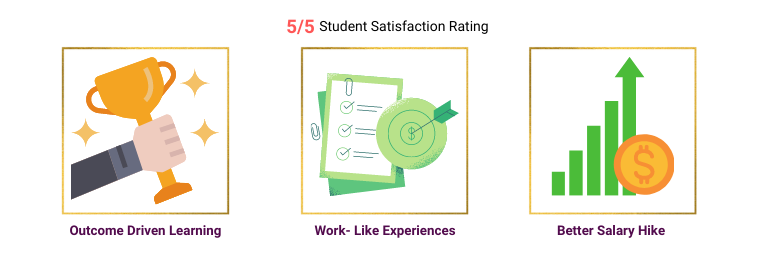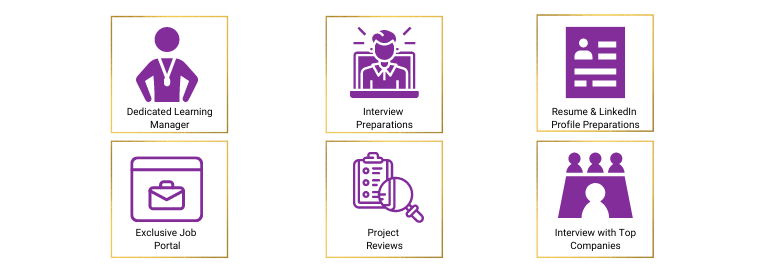Professional Scrum Master (PSM1) Online Training
The Professional Scrum Master™ I certification course is about mastering the Scrum framework: planning for product delivery, understanding the nuances behind working with people and teams and mastering the role of a Scrum Master as a servant leader. With training material created by Scrum co-creator Ken Schwaber, the PSM™ I course is a combination of instruction and team-based exercises and teaches what is at the heart of the Scrum and Agile movement.
Gain the skills for advanced thinking on servant-leadership to bring about behavioural shifts in people and teams and arm yourself with the knowledge and information to guide your real-world decision-making, especially when dealing with complexity. The Professional Scrum Master, a designation offered by Scrum.org™ to practitioners who successfully complete the Professional Scrum Master™ training and demonstrate their understanding by passing the exam, validates your expertise as a Scrum professional.
In collaboration with
Online Class
Projects
Hands-On
n/a

20 Hrs Instructor-led Training
Mock Interview Session
Project Work & Exercises
Flexible Schedule
24 x 7 Lifetime Support & Access
Certification and Job Assistance



Course Benefits




Professional Scrim Master (PSM1) Online Training Course Overview
1-The Scrum Framework
The principles and (empirical) process theory underpinning the Scrum framework, and the role of the Scrum Master in it
2-The Definition of Done
Learn to assess when work is complete on the product Increment, get a shared understanding on Product
3-Running a Scrum project
Equip yourself with the tools and techniques to run a Scrum project in your organization.
4-Working with people and teams
Understand the nuances of working with people and teams and how to bring about behavioural shifts.
5-Scrum in your organization
All you need to know about helping your organization adopt and Scrum and reap the benefits.
6-The role of the Scrum Master
Learn what the role of the Scrum Master entails and deeply understand the concept of servant-leadership.
- Project Managers
- Scrum Masters
- Scrum team members
- Developers
- Product Owners
- Software development managers
- Software Architects
- Product Managers
- Software Developers
- Software Coders
- Software Testers
- Team Leads/Team Members
- Students and individuals with interest in Agile and Scrum
- There is no set of eligibility requirements to attend the PSM™ certification training.
- Basic knowledge of Scrum in a real-world context is helpful, though not mandatory. The one-day Agile and Scrum Foundation training serves as a good primer.
Mentors Pool follows a rigorous certification process. To become a Professional Scrum Master, you must fulfill the following criteria:
- Online Instructor-led Course:
- Successful completion of all projects, which will be evaluated by trainers
- Scoring a minimum of 60 percent in the Professional Scrum Master quiz conducted by Mentors Pool
Once a candidate has undertaken the Professional Scrum Master™ course and earned their certification, their career will take a turn for the better.
Apart from being a mentor to other teams and companies, mentioned below are some of the other career options open to a certified Professional Scrum Master™.
- Certified Scrummaster® (CSM®)
- Information Technology (IT) Consultant
- Senior Software Engineer
- Senior Business Analyst
- Systems Analyst
- Project Manager, Information Technology (IT)
Talk to Us
IN: +91-8197658094
95 percent of organizations practice Agile development methods of which the majority (58 percent) are using the Scrum framework (14th State of Agile). Agile is the methodology of choice for companies and is increasingly popular as it helps them deliver the right product at the right time as quickly and efficiently as possible.
Consequently, the high demand for Agile and Scrum roles continues to be on the rise. LinkedIn reports that the Scrum Master role is one of the top ten most promising roles and the World Economic Forum has pegged it among the top ten emerging roles in Product Development.
Skills Covered
Fees
Online Classroom
- 20 Hrs of Instructor-led Training
- 1:1 Doubt Resolution Sessions
- Attend as many batches for Lifetime
- Flexible Schedule
Batches
Dates
Days
Timings
Enrolment validity: Lifetime
Login
EMI Option Available with different credit cards
Cart
Corporate Training
- Customised Learning
- Enterprise grade learning management system (LMS)
- 24x7 Support
- Enterprise grade reporting
Course Content
Professional Scrim Master (PSM1) Online Training Course Content
Topics
- Why PSM I Certification?
- Why this training course?
- Why this training course?
- Why Agile for Complex Adaptive Problems?
- Why Scrum?
Topics
- What is Scrum?
- What is in Scrum Framework?
- KWhat is Scrum Theory?
- What are the Scrum Values?
- What (Scrum) – Quiz
Learning Objectives
After completing this module, students will be able to:
- Explain why the artefacts, roles and events in Scrum are all important to a successful Scrum project.
- Discover suitable process within the Scrum framework for their organisation.
Topics
Scrum theory includes time-boxing, and specific roles, rules, and artifacts. All elements of Scrum complement each other to form a consistent whole. All work is performed in Sprints. All base rules, events, and roles are described in the Scrum Guide, the acknowledged Scrum body of knowledge. Each part of Scrum ties back to the principles and theory.
- Scrum Events – Every event in Scrum is an inspect and adapt opportunity. How are these events important? What are the impacts of missing one of these?
- Scrum Role – Every role in Scrum has specific accountabilities. What are their accountabilities? Why are they important? How are they different to traditional project management roles?
- Scrum artefacts – Every artifact in Scrum is transparent so organisation can inspect and adapt based on it. Why are these artefacts important?
- Sprint – The Sprint is the heartbeat of the Scrum framework. What is a Sprint? What are the criteria of a successful Sprint?
Hands-on Exercises
- Students will experience the Scrum framework by building a small website in multiple Sprints.
- Students will collaborate with other students to define a process within the Scrum framework.
Learning Objectives
After completing this module, students will be able to:
- Explain what is Agility and the relation to Scrum.
- Discover where Scrum is not suitable.
- Understand the impact of the transparency that Scrum brings and requires, and how Scrum is best used to increase an organization’s agility.
- Explain how Scrum implements empiricism in software development.
Topics
Scrum is founded on empirical process theory to deal with the complexity typical to software development. All principles and values of Scrum are based on the fundamental view of software development as creative and complex work.
- How is empirical approach different to defined approach?
- What makes Scrum different to traditional project management approach?
- What is Agile?
- How does Agile relate to Scrum?
- Why should we be Agile and use Scrum?
- In what case is Scrum not suitable?
Hands-on Exercises
In this module students will learn:
- Create matrix for projects that is suitable for Scrum
- Create impact analysis for businesses using Scrum
Learning Objectives
After completing this module, students will be able to:
- Understand Product Backlog and Sprint Backlog
- Learn planning tactics
Topics
Scrum Planning is different from traditional project management. Student will exercise tactics on planning in Scrum.
- Product Backlog and Sprint Backlog – The Product Backlog and Sprint Backlog is the plan in Scrum. How is planning in Scrum different traditional project management? What is the best practice to do Lean Planning in Scrum? How to do Product Backlog Refinement?
- Product Backlog management – Product Backlog reflects the roadmap of the Product. How do we do Product Backlog management in Scrum?
- Product Backlog ordering – Prioritization is one way to order Product Backlog. What are the other techniques to order the Product Backlog?
- Product Backlog decomposition – Product Backlog is decomposed so that it can be done in one Sprint. How do we decompose Product Backlog to ready to execute Sprint Backlog?
Hands-on Exercises
- How to do Planning Poker to estimate Product Backlog Items.
- How to decompose a Product Backlog Items into smaller Product Backlog Items.
- How to decompose a Product Backlog Items into Sprint Backlog.
- How to plan a Sprint.
- How to forecast a release.
- Techniques in managing Product Backlog.
Learning Objectives
After completing this module, students will be able to:
- Define what is required for high-quality software.
- Discover what documentation is required in Scrum.
Topics
The criteria of success in Scrum are different to traditional project management.
This module will cover the followings:
- Definition of Done – Everyone in the organisation should have the same understanding about “DONE”. What is “DONE”? What is the impact of not having “DONE” software every Sprint?
- Quality – What is required for a high-quality software? Does Scrum need documentation?
Hands-on Exercises
In this module students will learn:
- List techniques and documentation that is required for Scrum project.
Learning Objectives
After completing this module, students will be able to:
- Discover what is required to generate a self-organising team.
- Get Scrum teams going, guide them along the way and help them continuously self-develop to become successful through better collaboration.
- Form a Scrum team.
Topics
Scrum Teams are self-organizing and cross-functional; which is very different from traditional development groups. Scrum Teams are empowered to do the right thing.
- Creating self-organizing teams
Learning Objectives
After completing this module, students will be able to:
- Understand the people aspect of Scrum, how to work with people.
- Discover coaching techniques that is appropriate for the team.
Topics
Scrum Masters are servant-leaders, with skills and tools to coach teams and organizations in understanding and applying Scrum. They master several techniques for coaching, conversation, and facilitation in order to help people, teams, and organizations discover what works best for them.
- Coaching and Facilitation Techniques
Learning Objectives
After completing this module, students will be able to:
- Identify who is the Scrum Master.
- Explain what makes Scrum Master different to traditional Project Manager.
- Discover skills and traits are required for Scrum Master to be successful in his role.
Topics
- This course put emphasizes on one of the roles in Scrum – the Scrum Master. Scrum Masters are servant-leaders with distinct skills.
Learning Objectives
- On completing this module students will understand aspects of the certification.
- The Professional Scrum Master course has two associated assessments and certification: Professional Scrum Master level I (PSM I) and Professional Scrum Master level II (PSM II).
- All participants completing the Professional Scrum Master course receive a password to take the PSM I assessment and are entitled to a discount on the PSM II assessment.
- These industry-recognized certifications require a minimum passing score on the associated rigorous assessment.
Topics
- Certification prerequisites and exam
Course Projects
Effective Practices and Federal challenges in Applying Agile Methods
The Government Accountability Office (GAO) Provides a review of the challenges and success factor for Agile projects within the federal government based on their investigation of four successful programs.
Borland's Agile Journey :A case study in Enterprise Transformation
In this 2009 case study, the vice president of Product Development at Borland talks about benefits they received and the key lesson learned in their three-year journey to apply Scrum to their business.
Moving Back to Scrum and Scaling to Scrum of Scrum in Less than a Year
This fifteen - minutes video presentation explains how one Brazilian company struggled with scrum, failed and then eventually succeeded.
Course Certification
To be a Professional Scrum Master™, you have to undertake the Professional Scrum Master™ course, post- that, pass the Professional Scrum Master™ Certification examination.
here are two ways for accessing the PSM™ examination. They are as follows:
With training:
- Enrol for the course.
- Pay the training fee, which is inclusive of the exam fee
- After successful completion of the course, participants will receive a password to attend the PSM I assessment.
- If the student takes the assessment within 14 days (of receiving this email with the password), and scores less than 85%, they are entitled to the 2nd attempt at no cost.
Without training:
- Visit Scrum.org website.
- Fill in your details.
- Make an upfront payment of $150
- Refer to the Scrum Guide
- Opt for the Open assessment
The Professional Scrum Master™ course from Scrum.org contains 80 questions which includes Multiple Choice, Multiple Answer and True/False. All the questions are set in English and one need to score 85% in order to successfully pass the exam. The exam is taken online with only 60 minutes to attempt all 80 questions. You are expected to answer at least 68 questions correctly in order to pass the exam. The PSM exam does not require a proctor attending the exam.
Focus Areas of PSM Assessment:
- Inclusive of topics from several Focus Areas defined by the Professional Scrum Competencies
- Questions on your interpretation of the Scrum Guide and the application of Scrum values and Framework within Scrum Team.
- Many additional resources are available in the Scrum Master Learning Path to make you better prepared for the assessment.
After attending the course, if you attempt the PSM™ exam within 14 days and do not score at least 85%, you will be given a 2nd attempt at no cost. You can take as many attempts as you require, but for each new attempt you will have to pay the requisite fee.
The Professional Scrum Master™ certification course has three levels of examination PSM I, PSM II and PSM III.
Most organisations require PSM I Level to represent yourself as a Scrum Master. Completing the PSM I Level, prepares you better to take up PSM II Certification since PSM II is more about real-time applications. Completion of PSM II, makes you better prepared for PSM III, after which you can become a certified trainer. While completing each of these levels is not mandatory, they do serve the purpose of enhancing your skills and making you better as a Scrum Master.
Certification Course Reviews
Certification Course FAQs
PSM is the abbreviation for Professional Scrum Master™ and it entitles the job role of a facilitator for an agile development team. The Scrum Methodology revolves around the core principles that allow a team to self organize itself and manage tasks and situations quickly. The role of a PSM (Professional Scrum Master™) is to effectively act as servant leader and facilitator to a Scrum team, implementing Scrum best practices, Scrum tools and skillsets to create success.
A Professional Scrum Master™ is one who is responsible for managing the processes by understanding the Scrum values and principles. The job role of a PSM involves:
- Helping his or her team reach consensus at the end of the daily scrum
- Helping the team to understand what can be achieved in a specific time period
- The responsibility to remove obstacles that are hindering his or her team’s progress
- Scrum Master ensures the team doesn’t overcommit while ensuring that the team reached its highest potential.
In order to be recognised as a Professional Scrum Master™, you have to undertake the Professional Scrum Master™ course, after which you have to attend and successfully pass the Professional Scrum Master™ Certification examination.
Depending on which gateway you choose to acquire knowledge from the Professional Scrum Master™ course, the entirety of the course can range from 2 days to a week. Also, one needs to have patience in order to choose the correct platform, learn the materials and courseware that are provided, undertake the course and finally attend and successfully pass the Professional Scrum Master™ certification examination.
The salary of a certified Professional Scrum Master™ depends on a lot of factors, ranging from how many years they have been in the profession to their other certifications and credentials. With that being said, the global median salary for a certified Professional Scrum Master™ is $75,500 per annum, according to ZipRecruiter.
Listed below are the different job profiles with the average salary for a Professional Scrum Master™.
Based on Job Role/ Designation:
| Job Profile/Designation | Average Salary |
| Software Engineer | $70,398 |
| Software Developer | $59,701 |
| Mechanical Engineer | $60,001 |
| Electrical Engineer | $62,209 |
| Financial Analyst | $50,950 |
| Operation Manager | $75,310 |
| Office Manager | $49,941 |
| Executive Assistant | $58,975 |
| Director of Operations | $106,933 |
| General/ Operation Manager | $75,639 |
| Administrative Assistant | $42,095 |
| Chief Financial Officer | $146,171 |
Based on City:
| City | Salary/Annum |
| Bangalore, Karnataka | Rs 908,457 – Rs 2,213,786 |
| Pune, Maharashtra | Rs 597,016 – Rs 1,882,785 |
| Hyderabad, Andhra Pradesh | Rs 391,486 – Rs 1,768,743 |
| Chennai, Tamil Nadu | Rs 466,332 – Rs 1,350,000 |
| Mumbai, Maharashtra | Rs 610,419 – Rs 1,572,216 |
Based on Educational Qualifications:
| Educational Qualification | Salary/Annum |
| Bachelor of Engineering (BEng / BE) | Rs 469,792 – Rs 2,163,496 |
| Bachelor of Technology (BT / BTech) | Rs 579,310 – Rs 1,448,276 |
| Master of Computer Applications (MCA) | Rs 641,660 – Rs 1,493,770 |
| Bachelor of Science (BS / BSc) | Rs 599,407 – Rs 1,220,838 |
| Master of Business Administration (MBA) | Rs 1,185,000 |
Before you start preparing for PSM™ certification, you should know that you are not required to take a course. All you need is the knowledge of the framework and concepts of Scrum. You can either take references from the internet or join a training institute. Here are some more tips that will help you prepare for the PSM certification exam:
- Start with the Scrum Guide
- Familiarize yourself with the subject areas
- Take free practice tests at Scrum Open
- Practice with exam simulators
- Check out forum discussions and online articles






